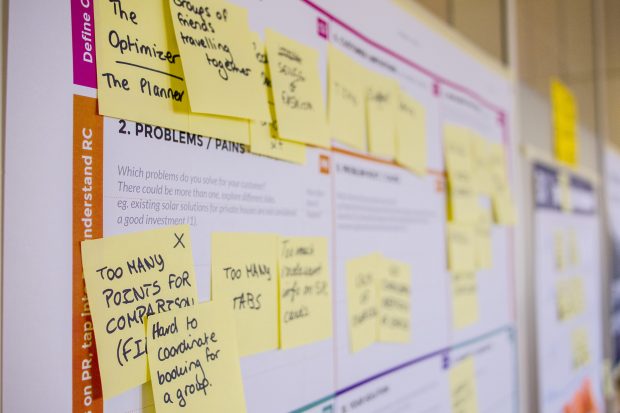
In December 2019, we completed our first discovery sprint as DDS. At a later date, we’ll write a blog post explaining in more detail the different types of projects we do at DDS and how we choose which ones to tackle.
For now, all you need to know is that a discovery sprint aims to cover the same sort of things you would expect from a GDS-style discovery phase, but we try to compress a discovery sprint into 3 weeks.
The R2-D2 discovery sprint
This discovery sprint looked into how Defence as a whole assesses 'readiness' (supply and demand) of the people and the equipment in our military. Reporting 'readiness' is done both against the Defence Plan (our committed forces) and for all other ad hoc tasks. And because we’re nerds, we have called this the 'Readiness Reporting and Deployability Discovery' – or R2-D2.
As you can imagine, a 3-week discovery is pretty intense, since they’re usually run over 6-8 weeks in Government departments. Nonetheless, 3 of us – myself, Alex Rogers and Rob Gallagher (who were loaned to us from other parts of the MOD, and to whom we’re immensely grateful!) – along with some ad hoc input from Rich and Elliott, conducted user research sessions with over 50 interviewees, covering each of the frontline commands (Army, Royal Navy, Royal Air Force), as well as central Defence, and some of Strategic Command.
There were definitely areas in which we weren’t able to cover enough of the different user groups, so we’ll need to revisit those and validate our findings during the alpha phase, but we still covered an awful lot in a very short time.
Lessons learnt
The United States Digital Service (USDS) has a helpful guide to running discovery sprints, which we ignored entirely; ironically, that guide is more or less a summary of our lessons learnt. Unfortunately, the USDS guide isn’t publicly available, but one of their founding members blogged about it in almost as much detail.
Lesson 1: Don’t start the 3 weeks from standing
One of the problems with a discovery sprint being 3 weeks long is that you need to optimise your time far more than you otherwise would need to. With more time, you can easily learn something, follow a lead, and then organise another meeting or interview.
That is extremely difficult with only 3 weeks: you’re asking someone to give you an hour of their time next week (for example) and some of those people are senior folks with busy diaries.
Better to have a couple of weeks ahead of the sprint to plan, including setting up meetings, and having a room available for the duration.
Lesson 2: If you do have someone with great connections, it helps!
Maybe it’s naive to assume that it’s possible to have everything organised before you begin. In our case, however, we were starting from such a stationary point, that we would not have been able to get in front of many people at all without having Rob on the team. Rob was already embedded in a relevant part of the business.
Lesson 3: Don’t leave things ‘til later
3 weeks eventually became 5, as it took us forever to go back through our notes, to extract insights, write them up, create a presentation, etc. 5 weeks still isn’t bad, but I reckon we could have bought some of that back if we had taken an hour a day, or a day a week, to do those things, while it was all fresh in our minds.
What’s next?
The sprint was successful and we got acceptance (in principle) of our recommendations off the back of it, so onwards to alpha – with a bit more prep this time!
If you’re in Defence and would like to know more about our findings, or if you’re just interested in what we’re doing, get in touch!
1 comment
Comment by Hollie posted on
Fantastic work, looking forward to reading further posts about your learnings!